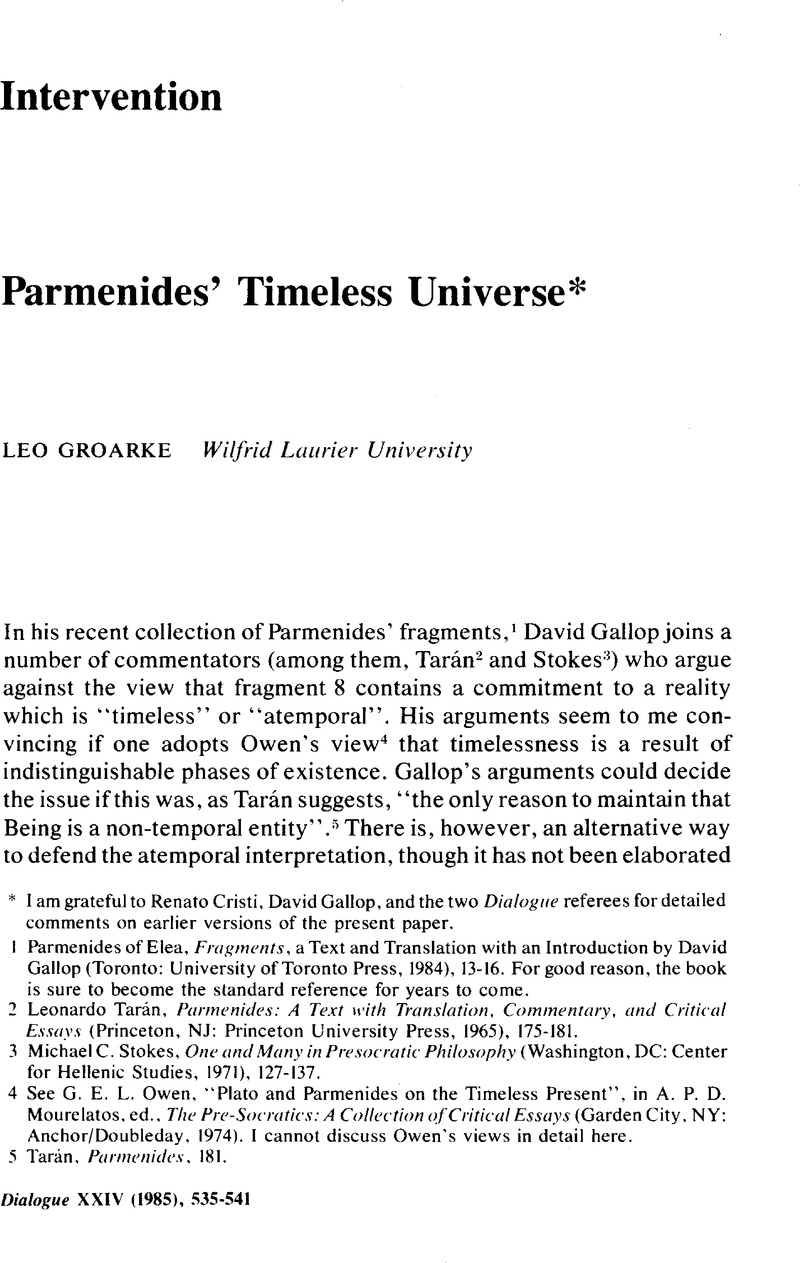Article contents
Parmenides' Timeless Universe*
Published online by Cambridge University Press: 13 April 2010
Abstract

- Type
- Intervention
- Information
- Dialogue: Canadian Philosophical Review / Revue canadienne de philosophie , Volume 24 , Issue 3 , Autumn 1985 , pp. 535 - 541
- Copyright
- Copyright © Canadian Philosophical Association 1985
References
1 Parmenides of Elea, Fragments, a Text and Translation with an Introduction by David Gallop (Toronto: University of Toronto Press, 1984), 13–16. For good reason, the book is sure to become the standard reference for years to come.
2 Taràn, Leonardo, Parmenides: A Text with Translation, Commentary, and Critical Essays (Princeton, NJ: Princeton University Press, 1965), 175–181.Google Scholar
3 Stokes, Michael C., One and Many in Presocratic Philosophy (Washington, DC: Center for Hellenic Studies, 1971), 127–137.Google Scholar
4 See Owen, G. E. L., “Plato and Parmenides on the Timeless Present”, in Mourelatos, A. P. D.. ed., The Pre-Socratics: A Collection of Critical Essays (Garden City, NY: Anchor/Doubleday, 1974). I cannot discuss Owen's views in detail here.Google Scholar
5 Taràn, Parmenides, 181.
6 For interpretations of Parmenides' similar to the one that I suggest, see the following: Guthrie, W. K. C., A History of Greek Philosophy, vol. 2 (Cambridge: Cambridge University Press, 1965), 29:Google ScholarCleve, Felix M., The Giants ofPre-Sophistic Greek Philosophy: An Attempt to Reconstruct their Thought (The Hague: Martinus Nijhoff. 1965). 531; andCrossRefGoogle ScholarGeach, Peter, Providence and Evil (Cambridge: Cambridge University Press. 1977). 53–54. None of these authors develops a detailed interpretationGoogle Scholar.
7 The question of Parmenides” view oftime (exemplified by disputes over fragment 8.5) is a thorny one. In Kirk, G. S., Raven, J. E., and Schofield, M., The Presocratic Philosophers (2nd ed.; New York: Cambridge University Press, 1983), Schofield writes, for example, that “Probably what Parmenides means to ascribe to what is is existence in an eternal present not subject to temporal distinctions of any sort. It is very unclear how he hoped to ground this conclusion in the arguments of [fragment 8]….” If the account Isugges t is correct, this conclusion is neither surprising nor difficult to understandGoogle Scholar.
8 Parmenides. Fragments, 14.
9 There are, it seems to me, problems with this interpretation. See, in particular. Stokes, Presocratic Philosophy, 129-130.
10 West, M. L., Early Greek Philosophy and the Orient (London: Clarendon Press, 1971), 218–226.Google Scholar
11 Jaeger, Werner, The Theology of the Early Greek Philosophers (London: Clarendon Press, 1947), 90–108.Google Scholar
12 Brumbaugh, Robert S., The Philosophers of Greece (Albany, NY: State University of New York Press, 1981), 50–58.Google Scholar
13 Verdenius, W. J., Parmenides: Some Comments on His Poem (Amsterdam: Adolf M. Hakkert, 1964), Appendix D, 67–68.Google Scholar
14 On this point, see Stace, W. T., Mysticism and Philosophy (Philadelphia, PA: J. F. Lippincott. 1960), 73, 91, 131-132.Google Scholar
15 Ludwig Wittgenstein, Tractatus Logico-Philosophiciis, trans. Ogden, C. K. (London: Routledge & Kegan Paul, 1922), 6.4311.Google Scholar
16 Parmenides, Fragments, 14.
17 Though such considerations could never be decisive, Gallop's interpretation has the further disadvantage of ascribing to the goddess an inference which is not philosophieally significant. To deduce that what is cannot have ceased to be (or that it cannot not yet be) from the fact that it is is to draw a valid but an obvious inference that does not merit much attention. In contrast, the problem of the existence of (and reference to) the past and future is worthy of extended philosophieal discussion. (It is an analogous question which lies at the bottom of the ontological argument for God's existence, for Anselm derives his existence from the fact that he necessarily—by definition—exists.)
18 Note Tarán's suggestion regarding 8.5 that Parmenides asserts “only that Being was not once (not being now), which constitutes a denial of olethros, nor will it be (not being now) which constitutes a denial of genesis” (Parmenides, 177). In fact, the claim that Being was not once (not being now) nor will be (not being now) only denies coming to be n i the future and perishing in the past, and is not in keeping with the broader rejection at 8.13-14, 8.21, and 8.40.
19 As Renato Cristi has pointed out to me, to come into being implies that one at one point was not. It follows that for what is to come into being implies that it at some point was not. It follows that there is no need for Parmenides to consider the possibility that what s i is generated from what is, and no need to attempt (as most commentators do) to interpret his remarks so that they deal with both possibilities (it immediately follows that there is no need to emend line 12). The second possibility is a non-starter.
20 Parmenides, Fragments, 13-14. I have already dealt with the term “continuous” (suneches).
21 Hermann Fränkel, “Studies in Parmenides”, in Allen, R. E. and Furley, D. J., eds., Studies in Presocratic Philosophy, vol. 2 (Atlantic Highlands, NJ: Humanities Press, 1975), 46. fn. 86.Google Scholar
22 Parmenides, Fragments, 28.
- 1
- Cited by




